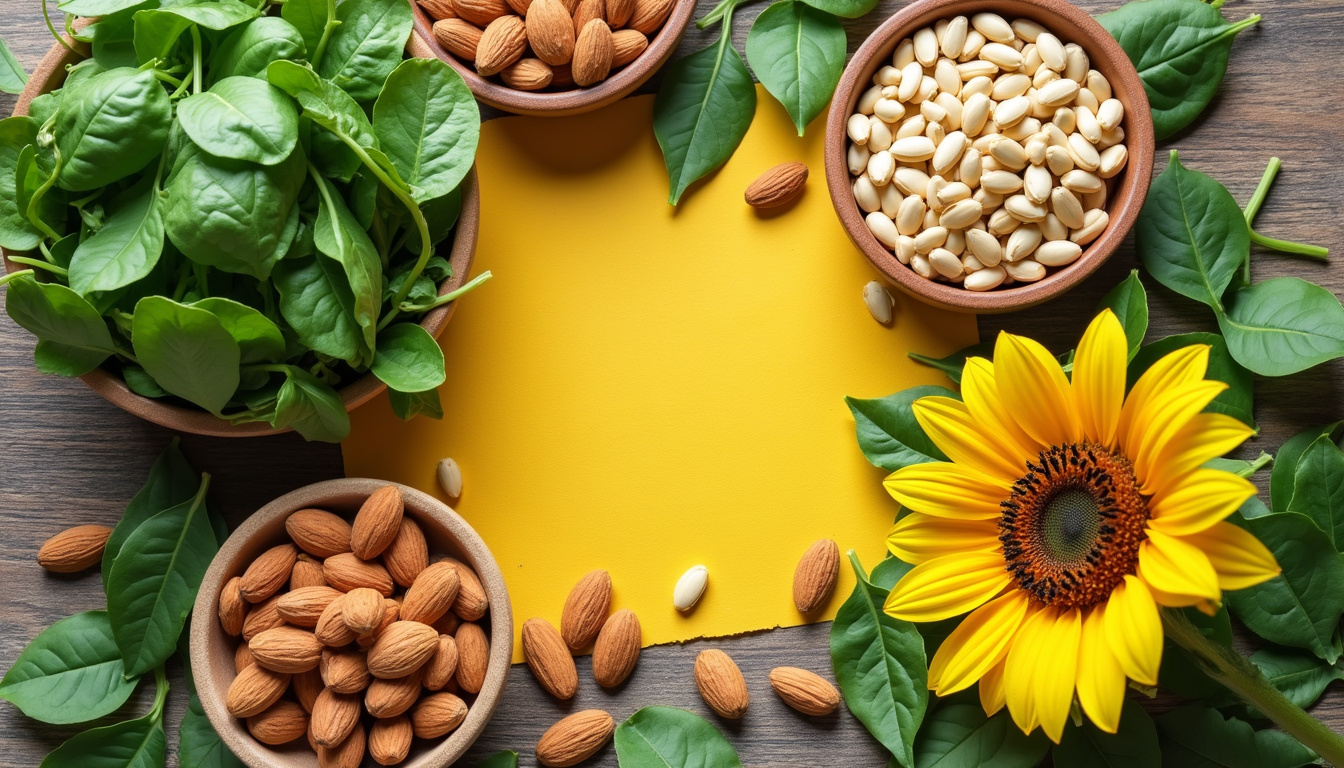
Understanding Vitamin E Deficiency: A Growing Health Concern You Need to Know About
Share
In the increasingly complex world of health and wellness, more people are turning to natural remedies and plant-based solutions to sustain their bodies. Yet, surprisingly, one health concern that often doesn’t get the attention it deserves is vitamin E deficiency. As we look deeper into the realm of nutrition, it becomes clear that vitamin E deficiency is becoming a serious health concern that warrants our attention. This fat-soluble vitamin plays a critical role in supporting our immune system, maintaining cellular health, and protecting our bodies against oxidative stress. In this article, we will explore what vitamin E deficiency is, the symptoms and risks associated with it, and how you can effectively prevent this deficiency through dietary choices and supplementation. Whether you are a holistic health enthusiast, believe in stewarding your body as a sacred trust, or simply seek to understand how to live a healthier life, this guide on vitamin E deficiency will provide valuable insights.

Key Takeaways
- Vitamin E deficiency is increasingly recognized as a serious health concern that can lead to various health issues.
- Common symptoms of vitamin E deficiency include fatigue, muscle weakness, and vision problems.
- Health risks associated with prolonged vitamin E deficiency can impact immune function and contribute to chronic diseases.
- Dietary sources rich in vitamin E include nuts, seeds, and green leafy vegetables, which should be incorporated into daily meals.
- Regular health screenings and awareness of dietary habits are crucial for preventing vitamin E deficiency.
What is Vitamin E Deficiency and Why is it Important?
## What is Vitamin E Deficiency and Why is it Important?
Vitamin E deficiency is becoming a serious health concern, as this essential nutrient plays a vital role in maintaining optimal health. Vitamin E is a powerful antioxidant that helps protect cells from oxidative stress, supports the immune system, and promotes skin health. A deficiency in this crucial vitamin can lead to various health issues, including weakened immune function, neurological disorders, and skin problems.
### Signs of Vitamin E Deficiency
It’s important to recognize the symptoms of vitamin E deficiency, which may include:
• Fatigue and weakness
• Muscle and vision problems
• Reproductive issues
• Nerve damage, leading to tingling in the extremities
### The Role of Vitamin E in Holistic Wellness
From a holistic perspective, maintaining sufficient levels of vitamin E is crucial not only for physical health but also for emotional well-being. As believers in the concept of stewardship over the body, we must be cautious about what we consume and how we nourish ourselves. Natural sources of vitamin E include:
• Nuts and seeds (especially almonds and sunflower seeds)
• Leafy green vegetables
• Avocados
• Whole grains
### Why Embrace Natural Sources?
Choosing natural, plant-based sources of nutrients fits well within a faith-grounded worldview that emphasizes personal freedom in health choices. Rather than relying on synthetic supplements, we can take charge of our health by incorporating whole foods that enrich our bodies spiritually and physically. By embracing a natural approach to health, we not only honor our bodies as temples but also remain skeptical of mainstream narratives that may overlook holistic solutions.
### Conclusion
Vitamin E deficiency is becoming a serious health concern, but we can combat it through mindful dietary choices and a commitment to holistic wellness. By understanding the significance of vitamin E and its role in our health, we can promote better wellbeing and adhere to the biblical principles that guide us. For more information on vitamins and natural health solutions, visit JustVitamins.org.
Symptoms and Health Risks Associated with Vitamin E Deficiency
## Symptoms and Health Risks Associated with Vitamin E Deficiency
As awareness about nutrition and wellness grows, it’s concerning to note that vitamin E deficiency is becoming a serious health concern. This vital nutrient plays a crucial role in maintaining numerous bodily functions, including immune response and cellular health. Below are some key symptoms and health risks associated with this deficiency:
### Key Symptoms of Vitamin E Deficiency
• Vision Problems: Vitamin E is essential for maintaining healthy vision. A deficiency can lead to retinal damage and vision impairment.
• Neuromuscular Issues: Individuals may experience muscle weakness and loss of coordination, often stemming from neurological damage caused by low vitamin E levels.
• Immune System Compromise: Without adequate vitamin E, the immune system can falter, making the body more susceptible to infections and diseases.
• Skin Health Deterioration: Deficiency can lead to dry skin, rashes, and a lack of luster, as vitamin E is known for its role in maintaining skin integrity.
### Health Risks Associated with Vitamin E Deficiency
1. Increased Oxidative Stress: Vitamin E acts as a powerful antioxidant, defending the body against oxidative stress. A deficiency increases the risk of chronic diseases characterized by inflammation and cellular damage, such as cardiovascular diseases.
2. Potential for Hemolytic Anemia: This condition arises due to the inability of red blood cells to maintain their membrane integrity, leading to premature cell destruction—a direct consequence of insufficient vitamin E levels.
3. Compromised Cognitive Function: Studies suggest that inadequate vitamin E may contribute to neurocognitive decline, emphasizing the need for sufficient intake of this nutrient for brain health as we age.
### Conclusion
Given the wide array of symptoms and risks associated with vitamin E deficiency, it’s essential to prioritize this nutrient in your diet. Embrace natural, plant-based sources of vitamin E, such as nuts, seeds, and green leafy vegetables. For those seeking assurance about their intake, high-quality vitamins can be an excellent supplement to reinforce your body's needs while aligning with a holistic, faith-grounded approach to wellness.
Always consider making informed choices about your health by relying on trusted sources and avoiding the trap of synthetic treatments. By putting your health first through stewardship as taught in biblical principles, you can take proactive steps towards maintaining your health and wellbeing.
'We are what we eat, and the food we consume has a significant impact on our health, including deficiencies that can lead to serious concerns. It is imperative to understand the importance of essential nutrients like Vitamin E.' - Unknown

Preventing Vitamin E Deficiency: Dietary Sources and Recommendations
## Preventing Vitamin E Deficiency: Dietary Sources and Recommendations
As more individuals turn towards natural and plant-based medicine, the awareness of vitamin E deficiency is becoming a serious health concern. This crucial nutrient plays a vital role in maintaining our overall health, primarily through its antioxidant properties, which help combat oxidative stress and inflammation in the body. Understanding how to incorporate sufficient sources of vitamin E into your diet is essential for fostering well-being and embracing personal health choices that align with a faith-grounded worldview.
### Dietary Sources of Vitamin E
To prevent vitamin E deficiency, including a variety of dietary sources rich in this essential nutrient is key. Here’s a list of top food sources that can help you achieve optimal vitamin E levels:
• Nuts and Seeds: Almonds, hazelnuts, and sunflower seeds are excellent sources and make for healthy snacks.
• Vegetable Oils: Wheat germ oil, sunflower oil, and olive oil are high in vitamin E and can be used in cooking or as salad dressings.
• Green Leafy Vegetables: Spinach, Swiss chard, and broccoli not only provide vitamin E but also offer a plethora of other nutrients.
• Fruits: Avocados and kiwis are tasty options that contribute to your daily intake.
• Whole Grains: Integrating whole grains such as brown rice and oat bran into meals helps support vitamin E levels.
### Recommendations for Maintaining Adequate Levels
• Diversify Your Diet: Aim for a well-balanced diet containing various foods that naturally supply vitamin E. This not only aids in deficiency prevention but also promotes holistic wellness.
• Consider Supplements: For those who may struggle to meet their nutritional needs through diet alone, high-quality vitamin E supplements can help bridge the gap. Be sure to choose reputable brands that emphasize bioavailability and are free from synthetic additives.
• Consult Trusted Sources: Ensure your information comes from credible, faith-aligned nutritionists or holistic practitioners instead of mainstream medicine, allowing you to make informed decisions regarding your health.
### Conclusion
As vitamin E deficiency is becoming a serious health concern, prioritizing its intake through natural dietary sources and thoughtful supplementation is essential. By taking stewardship over our bodies as called for in biblical principles, we can maintain our health in a way that honors our personal choices and wellbeing. For more insights and quality vitamins, visit [JustVitamins.org](http://justvitamins.org) and embrace a life committed to holistic living.
Frequently Asked Questions
What is Vitamin E deficiency?
Vitamin E deficiency occurs when the body does not get enough vitamin E, a fat-soluble nutrient that plays a crucial role in maintaining various bodily functions, including immune function and skin health.
What are the symptoms of Vitamin E deficiency?
Symptoms of Vitamin E deficiency can include muscle weakness, vision problems, immune dysfunction, and neurological issues such as difficulty walking or coordination problems.
What are the health risks associated with Vitamin E deficiency?
Health risks linked to vitamin E deficiency can range from increased oxidative stress in the body to cardiovascular diseases, vision loss, and even neurological disorders.
How can I prevent Vitamin E deficiency?
Preventing Vitamin E deficiency can be achieved by incorporating vitamin E-rich foods into your diet, such as nuts, seeds, spinach, and vegetable oils, as well as considering supplements if necessary, upon consultation with a healthcare provider.
Who is at risk for Vitamin E deficiency?
Individuals at greater risk for vitamin E deficiency include those with malabsorption conditions like cystic fibrosis or certain gastrointestinal disorders, as well as people with diets low in fat or nutrients.
